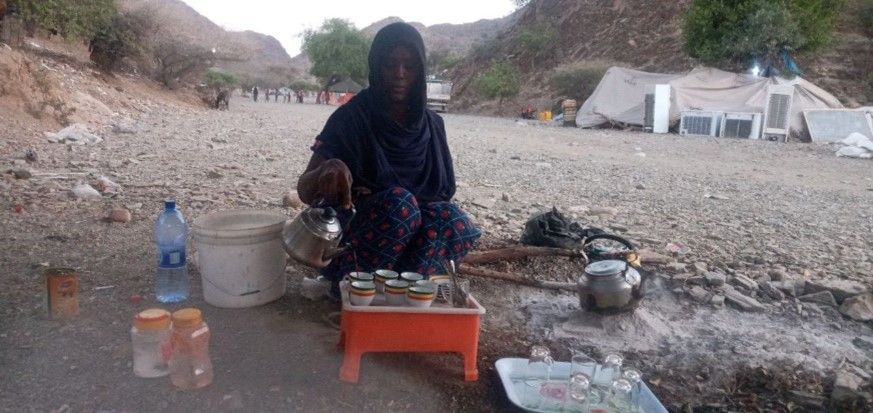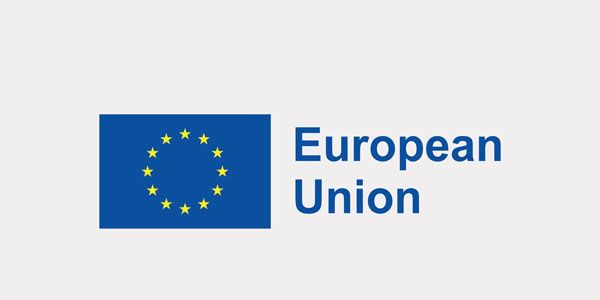“For the first months, we only heard the noises of the weapons from a distance. But one day, the Tigray People’s Liberation Front (TPLF) troops came to our doorstep unannounced. It was sudden. They occupied my house and threatened to kill me and my family. So, we were forced to leave without any of our things and flee,” explains Ulen Ali Hamed. She lived with her family in Berhale district in Afar region with her mentally ill husband and three children.
Leaving the family house also meant abandoning the small business that she was running with her son. “It was a small hotel. We would serve food and show movies and football games on a small TV,” she recalls. On a normal month they would earn some 3,500 Birr (€61). Just enough to put food on the family’s table. And now they had to leave it behind and flee.
Guyah camp for internally displaced people
When they arrived at Guyah camp for internally displaced people (IDPs), Ulen received food and other supplies from NGO’s at the camp. But barely enough to sustain them. And matters got worse, she says: “I lost my beloved son, the one who used to help me run my hotel, in a car accident.”
While still mourning the loss of her son, she heard that the war had ended and decided to return home.
She came back home only to learn that all her possessions had been stolen – and she was faced with the prospect of starting all over again. But that was not all.
“We came back because the war was over – but then we heard that the war had started again, and we had to leave again,” she laments.
Ulen gets cash assistance
This time, Ulen and her family arrived at Baraira camp for internally displaced people (IDPs).
Like their first time in a camp, it became a challenge for Ulen to look after her two young children and her mentally ill husband with the limited support she was getting from the government.
But then things changed for Ulen and her family. With a mentally ill husband, who was unable to work, and two small children in her care, Ulen was eligible for cash assistance from DCA Ethiopia.
Targeting those most in need
Ethiopia hosts large populations of refugees and internally displaced people. Both are vulnerable groups of people facing a range of challenges – critical among them are a lack of food and other basic items.
With funding from the European Union, DCA Ethiopia is targeting those most in need with food and cash assistance – including malnourished children up to 59 months, pregnant and lactating women, elderly, disabled people, unaccompanied and separated children, and other vulnerable groups like female headed households and poor households hosting IDPs.
The first sum of cash Ulen received was 3,875 Birr (€68) – and she decided to invest some of it in a business idea.
Cash to coffee and tea
”I decided to start a petty trade. Because no matter how small the business may be, it can generate consistent income and I hoped to make something out of it in the long run,” explains Ulen.
Ulen bought coffee, tea and sugar and started to sell tea and coffee under a simple shade constructed under a tree. And the idea turned out to be popular.

“My small business has enabled me to meet the needs of my children and my husband. In addition to our food needs, I am also able to afford my children’s school supplies and they have continued their education.”
Saving for a better future
Ulen hopes to go back to their house and the area they were forced to flee from one day when things have settled down and mines and explosives from the war have been removed.
“I have started to save a part of my profit. In the future I have a plan to grow and expand my coffee and tea business and get back to my hotel business,” says Ulen.
About the project
Through the project DCA Ethiopia targets vulnerable groups with direct food assistance and multipurpose cash transfers to cover the many unmet needs of these populations. This is done by providing e-vouchers for fresh food support, increasing food access and diversity, and treating acutely under-nourished children.
The project is implemented in partnership with Action Against Hunger and is funded by the European Union with co-funding from DANIDA.
Read more about the project: ‘Integrated, Nutrition Sensitive Emergency Response to South Sudanese Refugees and Host Communities in Gambella, Eritrean refugees and Tigrayan IDPs in Afar, and IDPs in Oromia regional state.’


